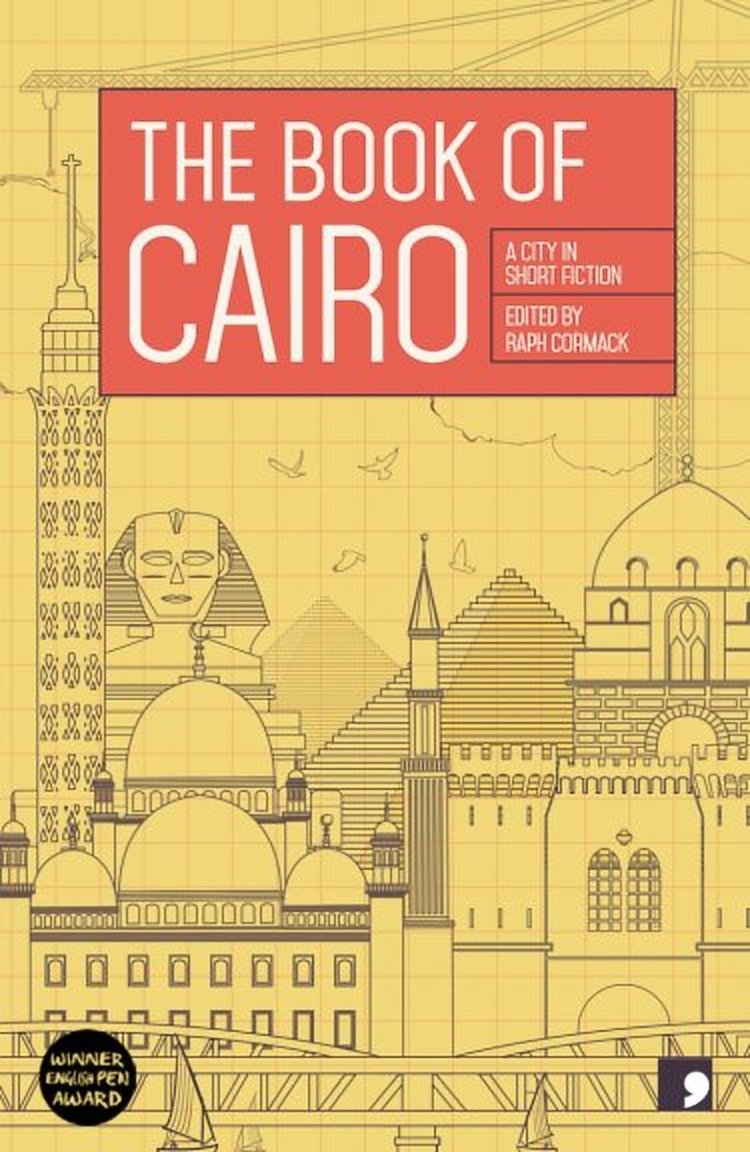https://egyptianstreets.com/2019/05/10/review-the-book-of-cairo-the-city-searching-for-truth/

For me, Cairo was never just a city, a word, or a geographical location, but a story book on its own. It is hard for a writer, thinker, artist or dreamer to look at this very odd-looking, messy and spirited place without drifting off to a dream and hold a yearning desire to transform it into a painting, a novel or a gripping film series.
In 'The Book of Cairo' published by Comma Press, this dream is reflected in each page and each writer's story. It features the work of a new generation of Egyptian writers, like Ahmed Naji, Mohamed Salah El Azab, Hend Jaafar, Hassan Abdel-Mawgoud, Nael el-Toukhy, Hatem Hafez and others who grew up mostly in the 70s and 80s – a time period in Egypt's history that signaled a sudden break from the decade before it.
After witnessing two intense transformations in its history – the January 2011 revolution and the July 2013 revolution – the writers in this story reflect a city that is yet searching for 'The Truth'. Some are searching for it while dozed off, preferring to turn to their dream-like romances, soap opera, football or drugs, while others have become too frustrated with the search, resorting instead to anger, force, torture, or madness.
In most of the stories, like 'Gridlock' by Mohamed Salah al Azab, 'Talk' by Mohammed Kheir, 'Whine' by Hatem Hafez , and 'Into the Emptiness' by Hassan Abdel Mawgood, I sense that most of the characters hold the very same problem, and that is the absence of identity. Instead, they all seem to carry labels of their profession, religion, or single characteristics, but never their true hearts.
There is 'The Doze', or Yasser the microbus driver who smokes hashish, 'The Engineer', or Hussein who likes everyone to call him an engineer, 'The Doctor' who everyone thinks is a bad surgeon and is trying to win back his reputation, the nameless 'Head of Department' who still cannot fit into his new position of power, and the madman living in the new and modern suburban districts of Cairo constantly trying to get back to 'his old self – or perhaps the old city of Cairo.For that very reason, the characters lose their mercifulness, forgiveness and humanity, and instead judge others for their 'flawed' characteristics.
"All my classmates at university worked under the assumption that I was strange… We always prefer to reduce people to a single trait, one that we let overshadow their other characteristics. We say someone is good or evil, intelligent or stupid, sunny or sour-faced, normal or strange. I used to think it was others who were strange," the man isolated in the new Cairo expressed.
There were only a few characters that had names, mostly in the sweet romance stories like 'The Other Balcony' or 'Siniora', and I like to think it's because they are still connected to their hearts, as the label or position of 'power' is absent, and that is when you truly see the human side of the character.
This humanity that is sensed in the middle of the book suddenly stops with 'Hamada Al Ginn' by Nael Eltoukhy, imitating a pyramid shape that abruptly shrinks or changes shape at the top. It is the story of a police officer that is on a very tough and difficult mission to search for 'The Truth' for the entire population, as instructed by his General.
"Everything is ambiguous and obscure; the youth of today are full of doubts. You are only young, my lad. You don't remember what it was like in our day; everything was understood and well defined. People are confused now. The Truth has gone missing and your mission is to find it again," the General says.
Interestingly enough, the 'Truth' is never truly revealed to the audience, but the writer shows how gradually the police offer increasingly becomes frustrated and violent in the search for it. In the middle of a brutal clash between him and a suspect, Hamada al Ginn, the latter chooses to expose the Truth on one condition – to treat him with respect.
Later in the story, the police officer is promoted to the rank of Lieutenant-Colonel, yet with a new and fresh perspective. He no longer felt that he could reach the Truth all by himself or through force, but with respect. And on that day, the writer says, "the State Security investigators concluded one of their most dangerous operations (uncovering the Truth), achieving a decisive victory…since that day the Egyptian people have been the only people to know The Truth and they boast of it to all other nations"
There is yet no clear idea of what this 'Truth' is, but it seems to be that this is the main dilemma, as each person or party holds their own idea of 'Truth', yet preferring to block communication or conceal it from the other.
In the introduction, the editor says that this book "tells the story of a city that is struggling to forget", and indeed, the old memories of its history still live deeply in its heart.
There is still a longing to 'define' the Truth to all nations, as Nasser once did in the 50s and 60s, and the Ancient Egyptians did in the ancient past.
Is Nasser still alive? Is he dead? And is King Tutankhamun going to rise from the tomb to finally define it? Some Egyptians hope that it would be the case, but I also like to believe that the key lies with the Egyptian people themselves – the drivers, engineers, doctors, dancers, writers, journalists, teachers – all those with a confused identity yet are still trying to connect to their hearts, it is through them that the 'Truth' will be defined.
-- Sent from my Linux system.
No comments:
Post a Comment